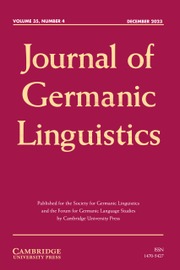Article contents
Null Subjects in Early Icelandic
Published online by Cambridge University Press: 11 February 2016
Abstract
This paper investigates the possibility of subject omission in the history of Icelandic, including the syntactic and pragmatic conditions under which it could arise. Based on regression analysis of substantial data drawn from the IcePaHC corpus, we provide robust quantitative support for Hjartardóttir's (1987) claim that null subjects persist until a very late stage in Icelandic. We also argue, contra Sigurðsson (1993), that only one licensing mechanism is needed for null subjects in early Icelandic. Moreover, on the basis of the position of the null subjects and their person features, we argue that the modern stage, where (predominantly 3rd person) pro-drop yields to a system permitting topic drop of all persons, arises in Icelandic in the early twentieth century.*
- Type
- Articles
- Information
- Copyright
- Copyright © Society for Germanic Linguistics 2016
References
REFERENCES
- 5
- Cited by


